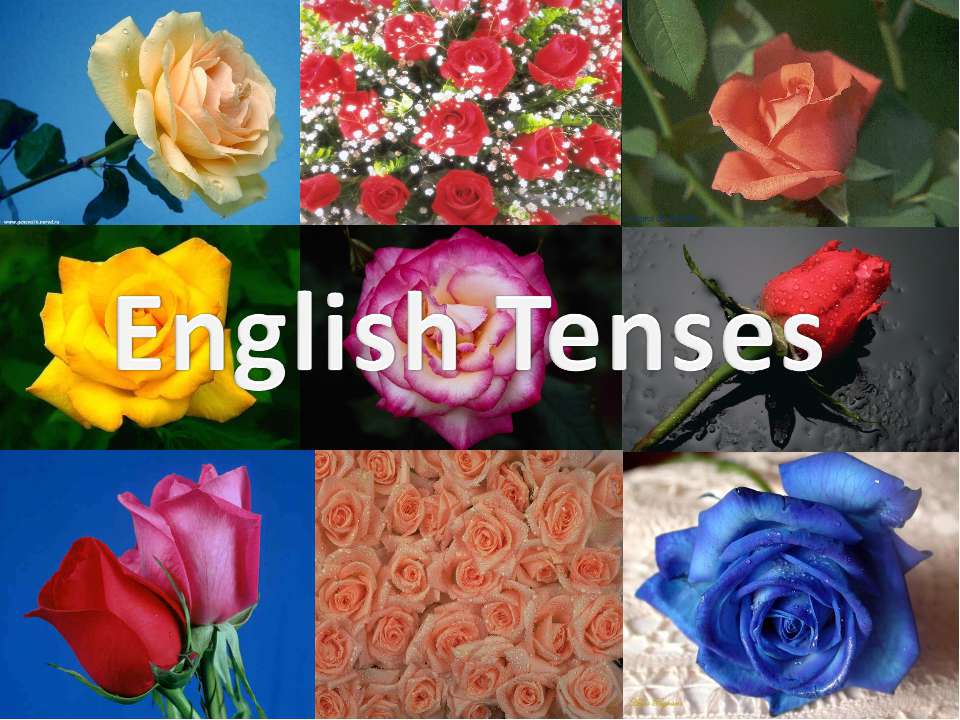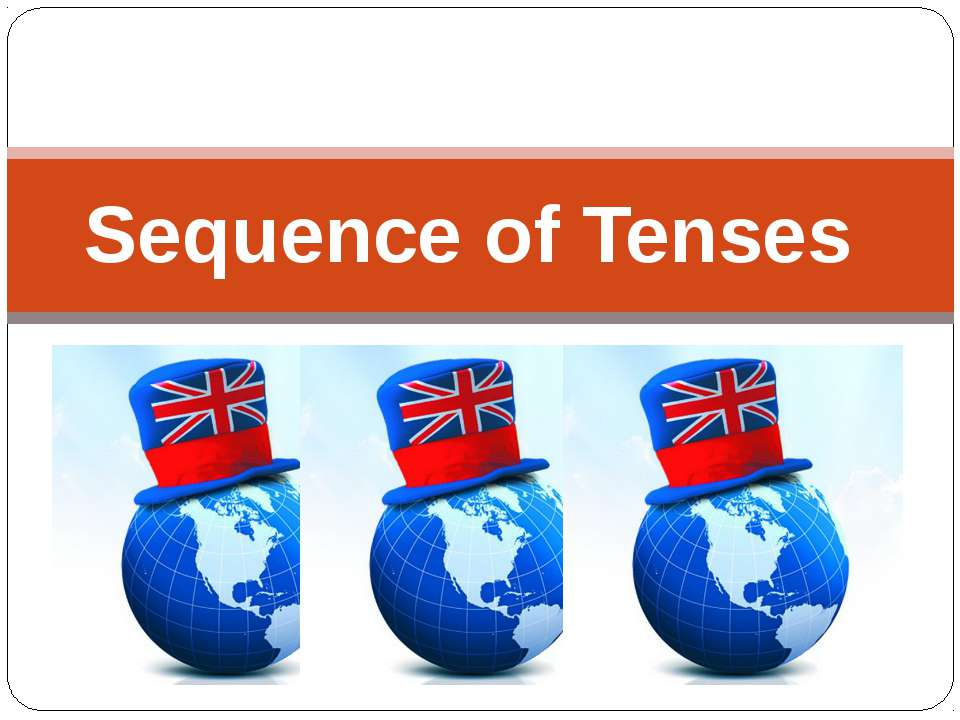English Tenses

- Рубрика: Презентации / Презентации по английскому языку
- Просмотров: 179
Презентация для классов "English Tenses" онлайн бесплатно на сайте электронных школьных презентаций uchebniki.org.ua
SYSTEM FORMATION USE Present Tenses Past Tenses Future Tenses Present Simple Present Progressive Present Perfect Present Perfect Progressive Past Simple Past Progressive Past Perfect Past Perfect Progressive Future Simple Future Progressive Future Perfect Future Perfect Progressive Present Simple Present Progressive Present Perfect Present Perfect Progressive Past Simple Past Progressive Past Perfect Past Perfect Progressive Future Simple Future Progressive Future Perfect Future Perfect Progressive
Present Simple Progressive Perfect Perfect Progressive usually always often now just already for 2 hours since 2 o’clock Она всегда сажает розы весной. Она сажает розы сейчас Она только что посадила розы. Она сажает розы с двух часов. V V(s) (do, does) Am Is V ing are Have Has V ed (3) Have been Has been V ing She always plants roses in spring. She is planting roses now She has just planted roses. She has been planting roses since two o’clock.
Past Simple Progressive Perfect Perfect Progressive yesterday last year two days ago The day before at 5 o’clock yesterday; when he came; while I was working by 5 o’clock yesterday; before he came for 2 hours; since 2 hours when he came Она посадила ( садила)розы вчера. Она сажала розы, когда он пришел Она посадила розы до того как он пришел. Она сажала розы уже два часа, когда он пришел. Ved (2) (did) was V ing were had V ed (3) Had been V ing She planted roses yesterday. She was planting roses when he came. She had planted roses before he came. She had been planting roses for 2 hours when he came
Future Simple Progressive Perfect Perfect Progressive tomorrow; next summer; in two days at 5 o’clock tomorrow; when he comes by 5 o’clock tomorrow; When he comes for two hours tomorrow; when you come Она посадит розы весной. Она будет сажать розы в 5 часов завтра. Она посадит розы до того как он придет. Она будет сажать розы уже два часа, когда ты придешь. will V will be V ing will have V ed (3) will have been V ing She will plant roses next spring. She will be planting roses at 5 o’clock tomorrow. She will have planted roses before he comes. She will have been planting roses for 2 hours when he comes.
She plants roses in spring. + - ? She does not plant roses in spring. Does she plant roses in spring? Yes, she does. No, she does not.
She is planting roses now. + - ? She is not planting roses now. Is she planting roses now? Yes, she is. No, she is not.
She has just planted roses . + - ? She has not planted roses. Has she planted roses? Yes, she has. No, she has not.
She has been planting roses since 2 o’clock . + - ? She has not been planting roses since 2 o’clock. Has she been planting roses since 2 o’clock? Yes, she has. No, she has not.
She planted roses yesterday. + - ? She did not plant roses in yesterday. Did she plant roses yesterday? Yes, she did. No, she did not.
She was planting roses when he came . + - ? She was not planting roses when he came. Was she planting roses when he came? Yes, she was. No, she was not.
She had planted roses before he came . + - ? She had not planted roses before he came. Had she planted roses before he came? Yes, she had. No, she had not.
She had been planting roses for 2 hours when he came . + - ? She had not been planting roses for 2 hours when he came. Had she been planting roses for 2 hours when he came? Yes, she had. No, she had not.
She will plant roses tomorrow. + - ? She will not plant roses tomorrow. Will she plant roses tomorrow? Yes, she will. No, she will not.
She will be planting roses when he comes. + - ? She will not be planting roses when he comes. Will she be planting roses when he comes? Yes, she will. No, she will not.
She will have planted roses before he comes . + - ? She will have not planted roses before he comes. Will she have planted roses before he comes? Yes, she will. No, she will not.
She will have been planting roses for 2 hours before he comes . + - ? She will have not been planting roses for 2 hours before he comes. Will she have been planting roses for 2 hours before he comes? Yes, she will. No, she will not.
1. The sun rises in the East. Солнце встает на востоке. (всегда) 2. He gets up at 7 o’clock. He plays tennis every day. Он поднимается в 7 часов. Он играет в теннис каждый день. (так он привык) 3. She looks like her mother. I don’t know his name. Она похожа на свою мать. Я не знаю его имени. (вообще) 4. Bob passes the ball to Johnson and… Боб передает мяч Джонсону и…. (футбольный репортаж) 5. I think we are wrong. It is windy today. Я думаю, что мы ошибаемся. Сегодня ветреный день. (состояние) 6. Tomorrow is Tom’s birthday. Завтра день рождения Тома. (обязательно)
What are you doing? – I’m reading now. Wait for me! I’m coming. It is raining (at present) Что ты делаешь? – Я читаю. (сейчас) Подожди меня! Я иду. (сейчас) Идет дождь. (в данный момент) 2. We are living in a small flat. (at present). We (normally) live in a village near London. Мы живем в маленькой квартирке. (только в настоящий момент) Мы живем в деревне под Лондоном. (всегда, обычно) 3. When are you meeting Bob? – I’m meeting him at 12 o’clock tomorrow. Когда ты встречаешься с Бобом? – Я встречаюсь с ним завтра в 12 часов. (таковы планы на будущее)
1 see feel recognize hear smell appear look taste seem sound Can you hear the wind? 2 want wish hope refuse like forgive love prefer hate Which chocolate do you like best? 3 think realize mean expect know forget believe agree understand feel remember guess I think the shop is open now.
1. I have studied English since1993. how long have you had that bicycle? Я учу английский с 1993 года. Как долго у тебя этот велосипед? (период времени) 2. I have visited London, but I have never been to Paris. Я был в Лондоне, но никогда не был Париже. (до сих пор) 3. Do you want to see the new film “Police School 6”? I have already seen it? Have you seen “The Treasure Island”? Хочешь посмотреть новый фильм «Школа полиции 6»? Я уже видел его. Ты видел «Остров сокровищ»? (в последнее время) 4. I’ve just had a delicious cake. Я только что съел вкусный кекс. (действие только что произошло) 5. Somebody has borrowed my pen. Lucy isn’t here. She has gone shopping. Кто-то взял мою ручку. Люси нет. Она ушла за покупками. (результат имеет место сейчас)
Where have you been? – I’ve been returning a library book. What have you been doing? – I’ve been cooking breakfast. Где ты был? – Я возвращал книг в библиотеку. Что ты делала? – Я готовила завтрак. (действие только что закончилось) 2. He has been writing the story of his life. (He has written the story of his life) Он пишет историю своей жизни. (ему еще долго писать) (Он написал историю своей жизни) 3. He’s been building his garage for ages. We’ve been living in this flat since 1980. Он строит свой гараж целую вечность. Мы живем в этой квартире с 1980 года. 4. Look! It’s been raining. Смотри! Прошел дождь. (Улицы еще мокрые)
When did you buy that dress? I bought it yesterday. The train left at 9.15. Когда ты купила это платье? Я купила его вчера. Поезд ушел в 9.15. (действие произошло в определенное время в прошлом) 2. Once there was a king, who had a beautiful daughter. Однажды жил-был король, у которого была прекрасная дочь. (состояние дел в прошлом.)
It was raining (1) when Bob left (2) my house. Шел дождь (1), когда Боб вышел из моего дома (2). (2 действие случилось на фоне 1) 2. I was reading while my sister was eating breakfast. Я читал, пока моя сестра завтракала. (оба действия длительные) 3. What were you doing at 7 o’clock yesterday? Что ты делала вчера в 7 часов вечера? (длительное действие в указанный момент времени)
When the match had finished (1), Bob left quickly(2). Lucy had cooked dinner (1) by the time Bob came home (2). It was (2) the first time he had visited the zoo (1) (Past-in-the-Past) Когда матч закончился (1) Боб быстро ушел (2). Люси приготовила обед (1) к тому времени, когда Боб пришел домой (1). Это был (1) первый раз, когда он побывал в зоопарке (2). (1 – сначала; 2 – потом) 2. If you had driven more carefully, you would have avoided this accident. (Unreal Past Perfect) Если бы ты вел машину более осторожно, ты избежал бы этой аварии. (но авария уже произошла)
I had been studying English for two years when I took the exam. Had it been raining before he crashed his car? No, it hadn’t been raining at all. Я изучал английский язык два года к моменту сдачи экзамена. (я учу его и сейчас) Шел ли дождь перед тем, как он разбил свою машину? (до и, может быть в момент столкновения) Нет, дождя совсем не было. (ни до, ни после) 2. It had been raining all night, and the streets were still wet in the morning. Всю ночь шел дождь, и утром улицы были еще мокрые. (результат налицо)
I’ll help you. Я помогу тебе. (обещание) 2. it’ll be windy tomorrow. Завтра будет ветрено. (предсказание) 3. Very well. I’ll buy it. Очень хорошо. Я куплю его. (решение принято в данный момент) 4. Perhaps I’ll do it. Возможно, я сделаю это. (есть вероятность) 5. What shall we do? Что будем делать? (предложение, получение советов) 6. Will you close the door? Не закроешь ли дверь? (приказ, просьба) 7. I won’t do it. Я не буду этого делать. (отказ)
I’ll be having a bath at 7 o’clock tomorrow morning. Я буду принимать ванну завтра в 7 часов утра. (указан момент времени в будущем) 2. Will you be going there? – Yes, I’ll be going there. Ты пойдешь туда? – Да, пойду. (без намека на вежливость, без желания) 3. I’ll be seeing him there tomorrow. Я увижу его там завтра. (он всегда бывает там в это время)
I am sure that he will have reached the restaurant (1) by 6 o’clock. They will already have left (1) by the time we get there (2). (past-in-the –future) Я уверен, что он доберется до ресторана (1) к 6 часам. Они уже уйдут (1) к тому времени, когда мы будем там (2). (1)– это как бы прошлое событие по отношению к (2)
I’ll have been reading for two hours when Bob comes home. Я буду читать (уже) два часа к тому времени, когда Боб придет домой.



































